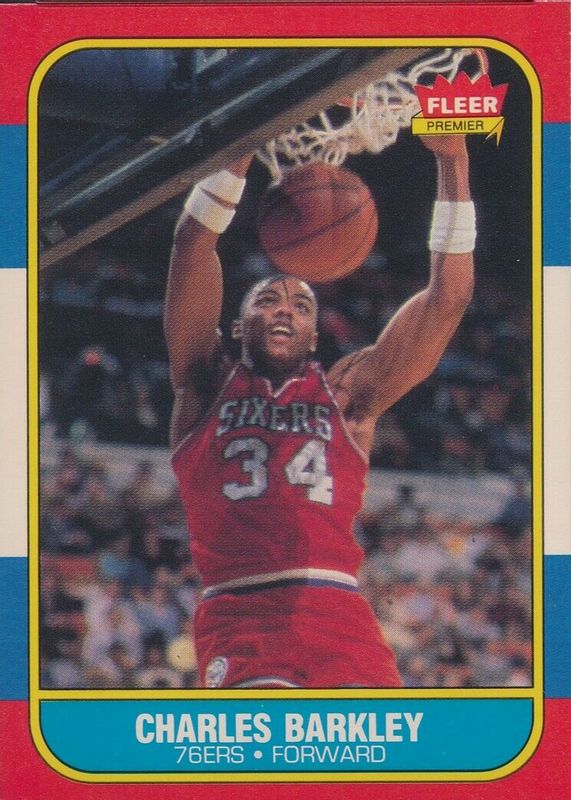
The Beginnings of Greatness: Exploring the 1986 Fleer Basketball #7 Charles Barkley Philadelphia 76ers Rookie Card
In the world of sports memorabilia, certain trading cards stand as iconic artifacts that encapsulate the rise of legendary athletes and the eras they defined. The 1986 Fleer Basketball #7 Charles Barkley Philadelphia 76ers rookie card is a prime example, representing the inception of a player who would become a basketball icon and a larger-than-life personality. This card not only marks the debut of Charles Barkley in the NBA but also serves as a touchstone for fans and collectors eager to celebrate his storied career.
The Unforgettable Charles Barkley

Charles Barkley, born on February 20, 1963, in Leeds, Alabama, is a name that echoes through the annals of basketball history. Renowned for his fierce playing style, relentless determination, and larger-than-life personality, Barkley’s impact stretched far beyond the basketball court. Standing at 6 feet 6 inches, he defied conventions as a power forward, using his agility, strength, and tenacity to dominate the game.
Selected fifth overall by the Philadelphia 76ers in the 1984 NBA Draft, Barkley wasted no time showcasing his immense talent. His ability to score, rebound, and play with unmatched intensity earned him recognition as one of the league’s premier players.
The 1986 Fleer Basketball Set and Barkley’s Rookie Card
The 1986 Fleer Basketball set revolutionized the trading card industry and remains highly regarded among collectors. Within this iconic collection lies the #7 Charles Barkley Philadelphia 76ers rookie card. The card’s design, a snapshot of the mid-1980s aesthetic, features Barkley donning the distinctive 76ers uniform, exuding a sense of anticipation and promise. The bold colors and clean layout capture the era’s excitement and energy.
On the reverse side, collectors can find key statistics from Barkley’s early career, providing insight into his impact as a rookie.
The Spark of a Legend
Charles Barkley’s influence extended well beyond his on-court abilities. His charisma, unfiltered honesty, and genuine love for the game endeared him to fans and earned him the nickname “The Round Mound of Rebound.” Barkley’s larger-than-life persona made him a media favorite, and his candid commentary as an analyst after his playing days kept him in the spotlight.
Collectors’ Treasure and Nostalgia
For collectors, the 1986 Fleer Basketball #7 Charles Barkley Philadelphia 76ers rookie card holds immense value beyond its monetary worth. It represents a chapter in the illustrious career of a player who redefined the power forward position and brought a unique blend of athleticism and personality to the league. The card offers a tangible link to an era when basketball was undergoing a transformation and captures the nostalgia of fans who followed Barkley’s journey from his rookie days.
The 1986 Fleer Basketball #7 Charles Barkley Philadelphia 76ers rookie card is a testament to the beginning of a legendary career that transcended basketball courts and impacted popular culture. Charles Barkley’s journey from rookie to iconic figure serves as an inspiration for athletes and fans alike. This card stands as a cherished memento, reminding us of the moments that shaped Barkley’s legacy and the enduring impact he has had on the world of sports.
Charles Barkley, a basketball titan known for his captivating playing style and larger-than-life persona, carved an unforgettable legacy in the NBA. Born on February 20, 1963, in Leeds, Alabama, Barkley’s journey to greatness began when he was selected as the fifth overall pick by the Philadelphia 76ers in the 1984 NBA Draft. Standing at 6 feet 6 inches, Barkley defied conventional player classifications with his dynamic skills, positioning, and unrelenting energy.
Nicknamed “Sir Charles,” Barkley’s impact on the game was immediate. His ability to dominate the boards, score from various positions on the court, and lead fast breaks made him one of the most versatile players of his generation. Despite his height, Barkley became a legendary rebounder, earning his moniker as “The Round Mound of Rebound.” His boundless passion and tenacity made him a fan favorite and a force to be reckoned with on the court.
Barkley’s most memorable years came during his time with the Phoenix Suns, where he played from 1992 to 1996. His partnership with point guard Kevin Johnson and the Suns’ high-paced offense propelled them to the NBA Finals in 1993, where they faced Michael Jordan’s Chicago Bulls. Although the Suns fell short, Barkley’s contributions and charisma left an indelible mark on the franchise.
Throughout his illustrious career, Barkley amassed a remarkable list of accomplishments. He was named an NBA All-Star 11 times and won the league’s Most Valuable Player (MVP) award in 1993. His scoring prowess, combined with his unmatched rebounding and playmaking abilities, earned him a spot in the elite 20,000 points, 10,000 rebounds, and 4,000 assists club—a testament to his multifaceted skills.
Beyond his on-court achievements, Charles Barkley’s unfiltered and candid personality made him a sought-after media presence. His post-playing career saw him transition seamlessly into a successful career as a television analyst, where his insightful commentary and outspoken nature continued to resonate with fans.
Charles Barkley’s contributions to the game of basketball extend far beyond the statistics. He brought an authenticity and passion that endeared him to fans, and his impact continues to shape the sport and popular culture. His legacy as a Hall of Famer, Olympic gold medalist, and unforgettable personality cements his place as one of basketball’s most enduring and beloved figures.
Charles Barkley’s transition from the basketball court to the broadcast studio was a seamless and natural evolution that showcased his charisma, unfiltered opinions, and unparalleled ability to connect with audiences. After retiring from his illustrious NBA career, Barkley found a new home as a commentator on TNT’s “Inside the NBA,” where he quickly became a central figure and a fan favorite.
Known for his candid and often humorous remarks, Barkley brought a refreshing honesty to his role as a commentator. His willingness to speak his mind, even if it meant going against popular narratives, set him apart and endeared him to viewers. Barkley’s unfiltered approach allowed him to address sensitive issues in sports, society, and politics, making his commentary thought-provoking and engaging.
Barkley’s chemistry with fellow commentators Ernie Johnson, Kenny Smith, and Shaquille O’Neal transformed “Inside the NBA” into more than just a sports analysis show; it became a platform for insightful discussions, friendly banter, and memorable moments. The camaraderie among the team was evident, and Barkley’s larger-than-life personality provided the perfect foil to his colleagues’ insights.
One of the highlights of Charles Barkley’s tenure on TNT has been his annual “Barkley’s Golf Swing Challenge,” where he humorously raises money for charity based on the quality of his golf swing. This lighthearted segment showcases his willingness to poke fun at himself and engage in self-deprecating humor.
Barkley’s role on TNT’s “Inside the NBA” solidified his status as a beloved and influential sports personality. His commentary, marked by his candidness and sense of humor, resonates with fans and continues to entertain and provoke discussions around the world of sports and beyond. Charles Barkley’s transition to the commentator’s chair was undoubtedly a slam dunk, as he continues to leave a lasting impact on television and the world of sports analysis.
Charles Barkley’s engaging and often unfiltered personality has occasionally led to colorful interactions, and his “beef” with the city of Dallas is a prime example. The root of this playful rivalry traces back to Barkley’s days as an NBA player and has carried over into his role as a commentator.
The origins of the “beef” can be traced to the mid-1990s when Barkley, then playing for the Houston Rockets, made a bold statement criticizing the city of Dallas. He famously remarked, “I can be bought. If they paid me enough, I’d work for the Klan.” This statement, though intended as a humorous exaggeration, drew the ire of many Dallas residents and fueled the flames of rivalry.
Over the years, Charles Barkley’s playful jabs at Dallas have continued on TNT’s “Inside the NBA,” particularly during segments where he would playfully rib the city’s sports teams, fans, and even the state of Texas as a whole. These exchanges added a humorous and entertaining dynamic to his role as a commentator and brought lightheartedness to the ongoing “feud.”
While the “beef” is largely a playful and exaggerated rivalry, it underscores Barkley’s knack for engaging with fans and his willingness to embrace a good-natured back-and-forth banter. The interactions have become a part of his public persona, adding an element of fun and unpredictability to his commentary.
Ultimately, the “beef” between Charles Barkley and Dallas is a testament to his ability to entertain, engage, and connect with audiences in a way that only he can. His candidness, charisma, and willingness to lean into playful rivalries contribute to his enduring popularity and his status as a beloved figure in the world of sports media.
Charles Barkley and Michael Jordan, two basketball legends whose friendship once seemed unbreakable, found themselves in a situation where their bond was strained over time. The rift between these two iconic figures sent ripples through the sports world, leaving fans and observers both curious and saddened by the change in their relationship.
The friendship between Barkley and Jordan was forged during their playing days, as they battled each other on the court and shared camaraderie off of it. Their personalities and shared experiences created a strong connection that was evident in their public interactions and appearances together. Fans delighted in their banter, their laughter, and the genuine affection they showed for each other.
However, as time went on, the dynamic between Barkley and Jordan shifted. While both remained influential figures in the basketball world, they began to drift apart due to diverging views and life paths. One of the major points of contention between them was Barkley’s candidness in his role as a commentator on TNT’s “Inside the NBA.” Barkley’s willingness to criticize Jordan’s moves as an executive and owner of the Charlotte Hornets didn’t sit well with the competitive and often private Jordan.
Despite their differences, it’s worth noting that the rift between Barkley and Jordan doesn’t erase the history and camaraderie they shared during their playing days. The changes in their relationship reflect the complexities of personal growth, evolving perspectives, and the challenges that come with public personas.
The shift in their friendship serves as a reminder that even the strongest bonds can evolve over time. While the nostalgia of their past interactions remains, the reality of their evolving relationship underscores the unpredictability of life’s twists and turns. Regardless of the status of their friendship, Charles Barkley and Michael Jordan will always be remembered as basketball titans who left an indelible mark on the sport and the culture surrounding it.






